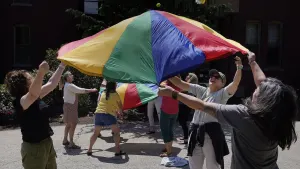More Stories
Coronavirus cases continue to soar across the country. On Monday, 169,000 new cases were reported in the U.S. There were also 889 virus-related deaths, according to Johns Hopkins University.
At least 12.4 million cases have been reported in the U.S. since the pandemic began, and more than 257,000 people have died.
A new model from Washington University suggests we could have 20 million confirmed cases in the U.S. by inauguration day on Jan. 20.
This morning, on the New Normal show, New 12's Elizabeth Hashagen was joined by world-renowned infectious disease and vaccine expert Dr. Peter Hotez.
Dr. Hotez is the Dean of the National School of Tropical Medicine at Baylor College of Medicine in Houston, and co-director of the Texas Children's Hospital Center for Vaccine Development.
On Monday, some doctors warned the CDC that public health officials and drug makers must be transparent about the side effects people may experience after getting their first shot of a coronavirus vaccine. Dr. Hotez talks about the communication strategy and side effects:
One doctor from the American Medical Association noted that both Pfizer's and Moderna's COVID-19 vaccines require two doses at varying intervals, and there was concern about patients’ willingness to come back for a second dose because of the potentially unpleasant side effects they may experience after the first shot. Dr. Hotez comments on why we may need a second dose of the vaccine in the video below:
Dr. Hotez explains what is the difference between the Emergency Use Authorization and FDA approval, and what it means:
Dr. Hotez answers questions about the COVID-19 vaccine safety, and what to expect next:
One-third of parents believe the benefits of gathering the family together for Thanksgiving is worth the risk of catching or spreading COVID-19, according to a new poll published Monday.
That's despite the fact that nine out of 10 parents said grandparents, one of the highest-risk groups for severe infections, were typically at their Thanksgiving gathering. Polling results were based on responses from nearly 1,500 nationally representative parents with at least one child age 12 or under.
"Our report suggests that while many children have spent less time with relatives during the pandemic, some parents may have a hard time foregoing holiday gatherings in order to reduce COVID-19 risks," said Sarah Clark, co-director of the C.S. Mott Children's Hospital National Poll on Children's Health at Michigan Medicine.
Dr. Hotez talks about how gatherings can spread COVID-19:
Watch the full New Normal show below:
More from News 12
1:28

5 simple steps for long-term benefits to your health and heart
1:32

8 tips for working safely during hot weather
3:31

Guide: Ways to set your child up for financial success
3:18

Guide: The importance of good sleep and how to get it

Guide: Mental health resources available in the tri-state
9:36
